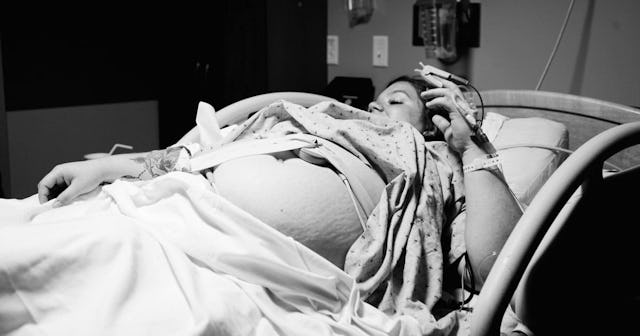I Never Thought PPD Could Kill Me, But It Almost Did

Trigger warning: suicide, postpartum depression
Happy ten months, my sweet baby boy. When I think about how we’ve crossed into “double digits,” my mind wanders to think how it’s been almost a year. Almost a year since I walked into the hospital for my scheduled c-section, checking in at the front desk just like any other doctor’s appointment. Almost a year since I lay on the stainless steel table and watched as my son was lifted out of my abdomen while the medical staff made small talk with my husband. Almost a year since I stared at you and felt that confusing rush of feelings: guilt, awe, responsibility, affection, was it also regret? Almost a year since we brought you home and I failed over and over to connect. Almost a year since your father had to lift me up from the floor, night after night, and tell me it was going to get better. Almost a year since that two-week mark came and went and I knew we had passed the infamous “baby blues.” Almost a year since I heard “He’s so perfect,” “You must be so in love,” “Welcome to the chaos!” in an endless stream of texts, calls, and visits that made me feel like such a fraud.
Almost a year since the first time I thought about how relaxing it would be to die.
Truth be told, this is a deeply uncomfortable essay to write. A couple of nights ago I made a remark to my husband that I wish I could find a tangible way to help the PPD/PPA cause, and he suggested that I write a social media post to do my (small) part to break the stigma. I initially balked at the idea of publicly sharing details of such an intimate and desperate time but … here we are. While the attention that postpartum depression (PPD) and postpartum anxiety (PPA) receives has certainly increased in recent years, the hushed tones of “What kind of mother …?” remain.
There is not “that kind of mother” – we are all that kind of mother. Suicide is among the leading cause of death in perinatal women.
I didn’t think I was at risk. I wasn’t “that kind of mother.” I already had a child and we breezed through her infant months into toddler years. I exercised every day. I had a rock-solid marriage, meaningful friendships, and a loving family nearby. My job was interesting and fulfilling, we lived comfortably, traveled, and I had even found a church I connected with. Our second baby was so badly wanted and the idea that he would come into a life of anything but a bit of a sleepless bliss never crossed my mind. But this time was so different.
Unsplash
My son was a difficult baby. He had silent reflux, barely slept, and cried inconsolably for hours at a time. He would refuse his bottle. He had blistering diaper rash. But he was a sweet, perfect, innocent baby and I couldn’t figure out why I couldn’t do this. I was obsessed with the idea of being a mother who could do it all and make it look easy; I went about my life as though everything was normal, but as time went on I realized I felt like I was observing someone else go through the motions of my life. I was suffering and so ashamed.
Three weeks after my son’s birth is the first time I excitedly thought about walking into traffic. Three weeks after my son’s birth is the first time I walked under a crane and pictured it falling and crushing my head. Three weeks after my son’s birth is the first time I fantasized about what a kitchen knife could do to my arteries. Three weeks after my son’s birth is when death crept into every hour of my desperate day. I knew I had to do something or I wasn’t going to survive to see his first birthday. I finally told my husband, I told my sister, and I got help.
I knew I had to do something or I wasn’t going to survive to see his first birthday. I finally told my husband, I told my sister, and I got help.
It wasn’t an easy road, but my recovery from PPD was certainly smoother than some. An intense period of talk therapy and medication brought me out of the fog quicker than expected. What helped most was honest accounts from other parents: one friend detailed nearly a year of crippling anxiety that forced her to take a leave of absence from her job, one friend recounted a feeling of deep regret that she had ruined her family’s lives when she brought home her second child, another noted the need for in-patient treatment after she fell into a postpartum psychosis with her first. These were all women who I admired: smart, beautiful, exceptional mothers who appeared to have it all together but who were suffering under the surface. I realized it was okay – normal, even – to fail. Whether it’s a two-week period of baby blues (up to 80% new mothers), a slip into PPA/PPD (10-20% new mothers), or just a few bad days (all of us) there is no shame.
Some days are more difficult than others but I finally feel the joy that I thought I would never regain. There is not “that kind of mother” – we are all that kind of mother. Suicide is among the leading cause of death in perinatal women. One in seven women experience PPD and up to 17% of new mothers experience PPA. These are serious, medical conditions that can rarely be helped without treatment. Check in on the new (and not-so-new) mamas in your life and whatever you do, withhold your judgment. It is the last thing she needs.
This article was originally published on